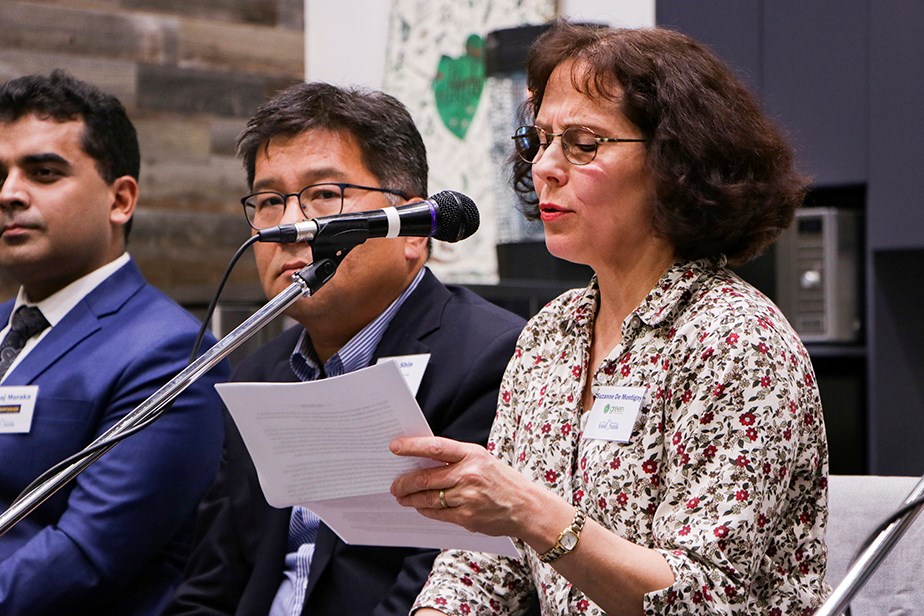Does a rising tide lift all boats, or do some of those boats need a little help to keep them afloat?
That’s essentially the question that was posed Thursday evening at a Burnaby forum on food security involving five candidates.
Speaking at the event were Burnaby South Conservative Jay Shin, New Westminster-Burnaby Green Suzanne De Montigny, Burnaby South Liberal Neelam Brar, New Westminster-Burnaby Libertarian Neeraj Murarka and Vancouver East People’s Party (PPC) candidate Karin Litzcke.
Burnaby North-Seymour New Democrat Svend Robinson was sick and could not attend, leaving his party unrepresented at the forum, held in the Greater Vancouver Food Bank’s new Burnaby warehouse.
The event saw no direct clashes, in stark contrast with the leadership debates, but the forum quickly saw a rift form between the left-leaning and right-leaning candidates.
PPC, Conservative and Libertarian candidates offered cascading degrees of low taxes and pumping up the private sector to handle affordability.
“What did the Conservatives do in government? We dropped the GST from seven per cent to five per cent, and every purchase you make at Tim Hortons or anywhere else becomes cheaper as a result,” Shin said. “Personally, I think the Liberals will raise the GST again to seven per cent to pay for their deficits.”
On the extreme end, Murarka said his party intends to eventually abolish taxes in time – he didn’t say how they would pay for infrastructure, but said in Canada there was a time “when we didn’t have these taxes.” (Taxes have always existed in Canada, but before the First World War, they applied mostly to trade and customs.)
Brar and De Montigny, on the other hand, argued the government has a role to play beyond lowering taxes and encouraging growth in the private sector.
“I find it really concerning today that some of my counterparts up here onstage have said that because we’re in a strong economy, our economic growth can itself solve food insecurity,” said Brar. “That’s simply just not true.”
De Montigny suggested a guaranteed livable income, a policy proposed by the Greens and considered for study by the NDP, would help solve food insecurity. A guaranteed income would mean everyone gets a certain amount of money from the government, which proponents say would free people up to get the job that’s right for them, enter training or start their own business.
“The idea is to lift children out of poverty and lift people out of poverty and get them off the streets,” De Montigny said.
The Liberals unveiled the country’s first national food plan in June, which included a proposal for a national school food program that would seek to subsidize meals for children in need.
De Montigny said she would “absolutely” support a national school food program, while right-leaning parties disagreed.
“We’re letting institutions take over from parents, and they’re raising our kids. The food is a lure; food detaches kids from parents,” Litzcke said in a broad swipe at public education.



